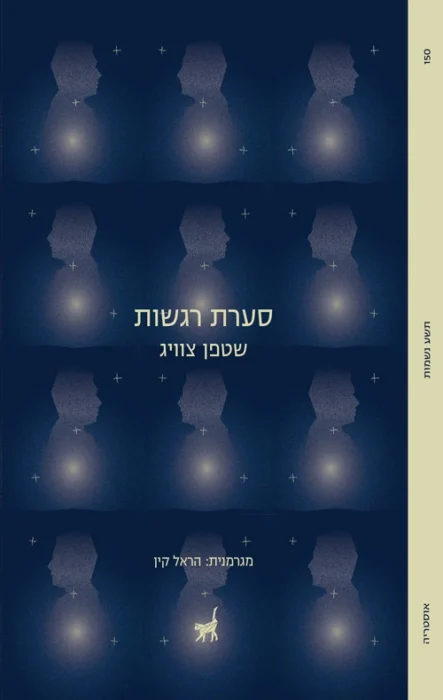For English review, please scroll down.
יש ספרים שנכתבו כדי לספר סיפור, ויש ספרים שנכתבו כדי להסתיר אותו.
סערת רגשות של שטפן צוויג שייך לסוג השני. מאחורי לשון עדינה ואיפוק גרמני מתנגן מסתתרת אחת היצירות הטעונות והנוגעות ביותר שלו: סיפור על אהבה שאסור היה לקרוא בשמה.
הנובלה ראתה אור ב־1927, בשנים שבהן צוויג כבר עסק באופן גלוי במאבק שבין רוח לתשוקה, בין אידיאליזם לאנושיות. זוהי תקופה שבה אירופה ניסתה לשקם את עצמה ממלחמה ולדכא את כל מה שנתפס כסטייה או חריגה מן הסדר המוסרי.
המספר, מורה מבוגר, חוזר אל ימי נעוריו ומתאר את הקשר הבלתי נשכח שנרקם בינו לבין המרצה הצעיר שלו. מה שמתחיל כהערצה אינטלקטואלית הופך בהדרגה להתאהבות מוחלטת.
המשיכה אינה נולדת במגע, אלא במבט, בשתיקה, בשיעור המתארך קצת מעבר לסביר.
זהו מתח שאי אפשר להסבירו רק במילים של ידע. מתח של גוף, של קרבה, של פחד.
צוויג לא כתב “רומן הומוסקסואלי” במובן הגלוי, אך זה בדיוק מה שעשה, בדרך היחידה שהייתה אפשרית באירופה השמרנית של תחילת המאה ה־20.
האהבה כאן איננה רק סוד אישי אלא עדות לעולם שאוסר על גבר לאהוב גבר אלא דרך קודים של הערצה, חינוך ושיח אינטלקטואלי.
וכשהמספר המבוגר מנסה ללכוד את הרגע ההוא של ההבנה, הוא כותב:
“אנחנו חווים שניות רבות לאין ספור, ובכל זאת הרי זאת תמיד שנייה אחת, יחידה, שמביאה הכול לידי הבשלה… שנייה קסומה, דומה לרגע שבו הורים אותנו… סוד יחידי שחווינו.”
זו אינה רק שנייה של תובנה, זו שנייה של הכרה עצמית.
רגע שבו הוא מבין לא רק את אהבתו למורה, אלא את מה שהחברה הכריחה אותו להדחיק: שהוא נמשך, שהוא אוהב, שהוא חי בגוף.
השפה שבה נכתב סערת רגשות איננה רק כלי ביטוי, אלא גם כלא.
צוויג משתמש במילים כדי לרמוז על דבר שאין לו שם, על רגש שהשפה עצמה לא יודעת להכיל.
הוא לא יכול לומר “תשוקה”, לכן הוא כותב “בלבול”. לא “אהבה”, אלא “הערצה”.
וכך נולד אחד הטקסטים האמיצים ביותר שנכתבו על תשוקה גברית מושתקת, טקסט שחושף כמה עמוק יכול להיות הרגש דווקא כשהוא חנוק.
בעולם שבו איפוק נחשב מעלה ותאווה נחשבה חולשה, צוויג כתב את אחת היצירות הנועזות של זמנו לא משום שהעז לחשוף, אלא משום שהעז לשתוק.
סערת רגשות הוא טקסט יפהפה, לא מפני שהוא נועז, אלא מפני שהוא מתאפק.
דווקא ההבלגה שלו היא שמטלטלת: המילים הנבלעות הן שמהדהדות.
זהו רומן שמבין שמה שלא נאמר לעיתים מדויק יותר מכל וידוי.
סערת רגשות / שטפן צוויג
הוצאת תשע נשמות, 2025, 112 עמודים
דירוג SIVI –
איכות אודיו –

There are books written to tell a story, and books written to hide one.
Confusion by Stefan Zweig belongs to the latter. Beneath its refined, melodic German restraint lies one of his most emotionally charged and poignant works: a story of love that could not be named.
Published in 1927, during a period when Zweig openly wrestled with the tension between spirit and desire, idealism and humanity, this novella reflects an era in which post-war Europe sought to rebuild itself by repressing everything considered deviant or morally suspect.
The narrator, an aging professor, looks back on his youth and recounts the unforgettable bond that formed between himself and his young mentor. What begins as intellectual admiration slowly evolves into complete infatuation.
The attraction is not born from touch, but from glances, silences, and lessons that last a little too long. It is a tension that cannot be explained by intellect alone, a tension of the body, of proximity, of fear.
Zweig did not write an “explicitly homosexual” novel, yet that is precisely what this is expressed in the only way possible in the conservative Europe of the early 20th century.
The love here is not just a private secret, but a testimony to a world that forbade men from loving men except through the coded languages of admiration, education, and intellectual discourse.
When the older narrator tries to capture the moment of realization, he writes:
“We experience countless moments, and yet there is always that single one which brings everything to completion… a magical second, like the instant of our birth… the one secret we truly possess.”
It is not merely a moment of insight, but of self-recognition, the instant he understands not only his love for his teacher, but also what society forced him to repress: that he desires, that he loves, that he inhabits a body.
The language of Confusion is not just a means of expression but a prison.
Zweig uses words to hint at something for which there is no name, a feeling the language itself cannot contain. He cannot say desire, so he writes confusion; not love, but admiration.
And thus he creates one of the most courageous texts ever written about suppressed male longing, a story that reveals how profound emotion can be, precisely when it is silenced.
In a world where restraint was virtue and passion was weakness, Zweig wrote one of his boldest works — not because he dared to expose, but because he dared to remain silent.
Confusion is a beautiful work not for its audacity, but for its restraint.
It reminds us that what remains unspoken can sometimes be truer than any confession.
לגלות עוד מהאתר Sivi's Books
Subscribe to get the latest posts sent to your email.

